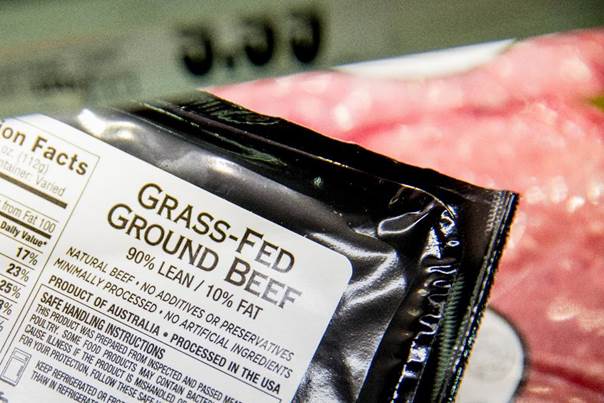Forbes: How Removal Of Origin Labels Could Hurt Our Food Supply
Dec 22, 2015 @ 07:00 AM 1,166 views
How Removal Of Origin Labels Could Hurt Our Food Supply
Contributor
I cover infectious diseases, medicine, drug development, and ethics.
By repealing the country-of-origin labels (COOL) labeling requirement, Congress has again hurt the American public. The COOL requirement had been in place since 2002. Because of a dispute with Canada, and Mexico, the World Trade Organization was going to allow a $1.01 billion tariff against the U.S. and retaliation by other countries for our “discriminating” against them through labeling where products were produced. There was apparently large support for repeal from the meat packing industry as well, as they found labeling cumbersome.
Say goodbye to these country-of-origin labels on packages of beef, pork and poultry. (AP Photo/Andrew Harnik, File)
Congress repealed the COOL act as part of their just-passed Omnibus spending bill. This is at direct odds with what the public wants. In a 2013 poll by the Consumer Federation of America, ~90% of those surveyed wanted such labeling. Whether it is because of concerns about food safety, ethics or sustainability and deforestation/environmental issues, many people want a choice in what foods and products they buy. Similar concerns occur in Europe, with 70% of those surveyed wanting to know where their food comes from, with the origin of meat being their biggest concern.
Remember the horsemeat scandal in Britain, in which up to 29% of “ground beef” in some markets was found to be horsemeat or the many other examples of adulterated food?
How about doctoring baby formula with toxic melamine, with subsequent deaths of six babies and sickening of 300,000? Or the adulteration of animal feed with melamine-contaminated vegetable protein in China? There were thousands of pet deaths from pet food made with contaminated wheat gluten.
Food safety and infections
Adulterants like melamine pose huge food safety issues. The concern extends to infectious diseases spread by contaminated food as well. For example, Brazil has had cases of “mad cow” disease (bovine spongiform encephalopathy) as recently as 2014, as well as problems with hoof-and-mouth disease. By eliminating labeling, consumers will no longer know where their meat was raised or slaughtered. Labeling is not only a U.S. concern, but is shared in the EU.
Recommended by Forbes
In my latest posts, I noted that China has heavy colistin use in their agriculture industry, as does Europe (to a lesser extent). These antibiotics are generally used as growth promoters, rather than for ill animals. As reported initially by researchers in China, Yi-Yun Liu’s team recently discovered the mcr-1 gene. This gene confers resistance to colistin, an antibiotic of last resort, making affected bacteria resistant now to all antibiotics. Doing their surveillance project on E. coli bacteria from food animals in China, the researchers also found that 21% of animals tested between 2011-14 and 15% of meat samples also had bacteria that carried this gene. Clearly, this further raises concerns about meat imports into the U.S.
Worse news this past week were the reports from the Danish National Food Institute’s Frank Aarestrup of mcr-1 in people and poultry samples. Then other researchers just reported mcr-1 found on four continents. Thus far, according to Lance Price, Director of the Antibiotic Resistance Action Center at George Washington University, we’ve not detected this resistance gene in the U.S., either in patients or in thousands of samples from the NARMS (National Antimicrobial Resistance Monitoring System) collection examined by the CDC, FDA, and USDA. No doubt we will soon.
In the just-passed FY 2016 budget, there were welcome and critically needed funding increases for studying antibiotic resistance and boosting prevention efforts. The CDC gained $160 million, NIH $100 million, FDA $8.7 million, and BARDA $96 million. Conspicuously absent? The USDA. Under the Omnibus bill, they will get increased funding for food safety inspection, but not for surveillance of resistant organisms in food. This glaring omission requires further examination and explanation…usually begun by following the money.
Dr. Price also raises another concern—that some urinary tract infections with multi-drug resistant E. coli are foodborne in origin. He’s found a correlation of these infections, known as the ST131 strain, with eating poultry. Another critical omission he stressed to me is in classifying which organisms are classified as food pathogens. For example, some bacteria like the ST131 are called “normal flora” rather than pathogens, a decision he disagrees with.
There is also news of yet another Chipotle outbreak, this time with a “different, rare DNA fingerprint” of the Shiga toxin E.coli O26, according to the CDC. There have been 53 cases in the first outbreak and five so far in this one, involving different states. The source food is not yet known. Just imagine how much worse these outbreaks will be if they involve a drug-resistant superbug, or if consumers (or public health) have their hands tied further by hiding the origins of the food. The Chipotle outbreak is a prime example of why repealing COOL is irresponsible.
While repeal of COOL is being applauded by some in the meat industry, it flies in the face of public safety and health as well as the wishes of the public. It’s critical to have a careful accounting of the supply chains with food and medicines, and transparency should remain a part of this.
As Dr. Price summarized this bill, “Congress wants to take away our right to know where our meat comes from right at a time when we could be facing untreatable superbugs on imported meat. This is literally and figuratively unCOOL!”
For more medical/pharma news and perspective, follow me on Twitter @drjudystone or here at Forbes

